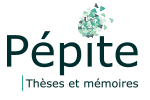Caractéristiques masticatoires chez des patients atteints de malformation congénitale du cervelet : étude auprès d'une population de 38 patients
- Enfant ; troubles cérébelleux ; mastication ; évaluation ; TOMASS
- Children ; cerebellar disorder ; chewing ; evaluation ; TOMASS
- Langue : Français
- Identifiant : LILU_SMOR_2021_067
- Faculté/Ecole : Médecine
- Date de soutenance : //2021
- Type de mémoire : Mémoire de Master
- Discipline : Mémoire d'Orthophonie
Résumé
Le cervelet a un rôle dans la régulation motrice, cognitive et comportementale. Les troubles cérébelleux ont donc un impact sur la motricité fine et globale mais leur impact sur la mastication est peu étudié. Ce mémoire s’intéresse à l’analyse de la mastication chez 38 patients pédiatriques (de 3 ans 2 à 16 ans 5) atteints de malformation congénitale du cervelet. L’expérimentation est conduite sur des patients vus en bilan pluridisciplinaire au centre de référence des Malformations et Maladies Congénitales du Cervelet de Lille. Nous analysons ici des variables démographiques, oro-myo-faciales et masticatoires ainsi que les scores au Test Of Masticating And Swallowing Solids. Nos résultats ont montré la présence de troubles masticatoires en cas de malformations congénitales du cervelet (n = 24, soit 63%) avec des déficits observés en clinique et au TOMASS (entre 50 et 61% des patients concernés selon les variables). De plus, un cercle vicieux entre mastication présente mais immature, déglutition dysfonctionnelle et présence de dysmorphose est statistiquement objectivé. Un suivi pluridisciplinaire précoce est donc primordial pour normaliser le lien entre fonctions et organes. Ce mémoire met en évidence les troubles masticatoires dans un contexte de malformation congénitale du cervelet et la relation tri-directionnelle entre mastication, déglutition et dysmorphose. La sensibilisation du corps médical et paramédical est nécessaire pour permettre une évaluation oro-myo-fonctionnelle pluridisciplinaire précoce. Cependant la littérature scientifique étant peu prolixe sur ce sujet, il serait bénéfique de réaliser une étude à plus grande échelle pour vérifier les résultats obtenus ici.
Résumé traduit
The cerebellum has a role in motor, cognitive and behavioral regulation. Cerebellar disorders therefore have an impact on fine and gross motor skills but their impact on mastication is understudied. This dissertation focuses on the study of mastication in 38 pediatric patients (from 3 years 2 to 16 years 5) with congenital malformation of the cerebellum. The experiment is conducted on patients evaluated in a multidisciplinary assessment at the reference center for congenital malformations and diseases of the cerebellum in Lille. We analyze here demographic, oro-my-facial and masticatory variables as well as the scores of the Test Of Masticating And Swallowing Solids. Our results showed the presence of masticatory disorders in cases of congenital malformations of the cerebellum (n = 24, i.e. 63%) with deficits observed in the clinic as well as in the TOMASS (between 50 and 61% of the patients concerned according to the variables). Moreover, a vicious circle between present but immature mastication, dysfunctional swallowing and presence of dysmorphosis is statistically objectified. An early multidisciplinary care is therefore essential to normalize the link between functions and organs. This dissertation highlights the masticatory disorders in a context of congenital malformation of the cerebellum and the tri-directional relationship between mastication, swallowing and dysmorphosis. The awareness of the medical and paramedical profession is necessary to allow an early multidisciplinary oro-myo-functional evaluation. However, as the scientific literature is not very extensive on this subject, it would be beneficial to carry out a larger-scale study to verify the results obtained here.
AUTEUR
- Stenger, Lise



